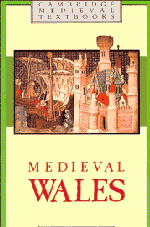Book contents
- Frontmatter
- Contents
- List of figures
- List of maps
- Preface
- 1 Wales in the dark ages
- 2 The Normans in Wales
- 3 The marcher lordships
- 4 The church in Wales
- 5 Crisis of identity: towards a principality of Wales
- 6 The Edwardian conquest
- 7 Under the heel: Wales in the fourteenth century
- 8 Resurgence and decline: the fifteenth century
- 9 A new dawn? The coming of the Tudors
- Select bibliography
- Index
- Cambridge Medieval Textbooks
1 - Wales in the dark ages
Published online by Cambridge University Press: 05 June 2012
- Frontmatter
- Contents
- List of figures
- List of maps
- Preface
- 1 Wales in the dark ages
- 2 The Normans in Wales
- 3 The marcher lordships
- 4 The church in Wales
- 5 Crisis of identity: towards a principality of Wales
- 6 The Edwardian conquest
- 7 Under the heel: Wales in the fourteenth century
- 8 Resurgence and decline: the fifteenth century
- 9 A new dawn? The coming of the Tudors
- Select bibliography
- Index
- Cambridge Medieval Textbooks
Summary
The transition from Roman Wales to medieval Wales shows some remarkable elements of continuity. Tribal chiefs, familiar to Roman military commanders, were the precursors of Welsh kings and princes, many of whom displayed the same qualities of courage and ruthlessness. The great estates of the Roman period are clearly to be discerned in the agrarian organisation of Wales in the dark ages, with their heavy dependence upon bondmen, slave labour and even with a physical structure not unlike the great latifundia of the empire. Historians concentrating on the period from the sixth century to the eleventh century have shown a curious lack of confidence in recent decades: they can explore technical problems to great advantage, but they are generally less willing to venture on a broad survey. In the universities of Wales, and notably of Cambridge, linguistic and literary studies are producing valuable reassessments of early sources and are achieving a sustained attack on critical problems. Perhaps because of the uncertainties which these studies have made apparent, and perhaps because this process of re-exploration is still far from complete, it is much more difficult to produce a detailed and authoritative survey of early medieval Welsh history. The broad sweep which Sir John Lloyd produced in 1911, a study which has been reissued four times in the last eighty years, is probably still the most widely read and influential book on the early history of Wales.
- Type
- Chapter
- Information
- Medieval Wales , pp. 1 - 19Publisher: Cambridge University PressPrint publication year: 1990



